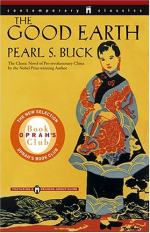|
This section contains 2,191 words (approx. 8 pages at 300 words per page) |

|
The Good Earth: Filial Piety: a Curse, or a Blessing?
In Pearl Buck's novel, The Good Earth, she implies that pre-Revolutionary Chinese people feel obligations: to treat their elders' wants as preeminent priorities, to use capital punishment to discipline their children, and to allow their elders to select their spouses and careers for them. Buck also shows how these obligations: partially cause Wang Lung's children to feel apathetic towards their land, and also how these obligations spark a chain reaction that eventually causes Wang Lung to fear and feel jealous of his third son. These obligations also contribute to the starvation of Wang Lung's children, O-lan's act of infanticide, Wang Lung's difficulty in asserting himself against others, and lastly, Wang Lung's love for his land up till his old age. To prove these generalizations, we will first reexamine previous incidences of filial piety as portrayed in The Good Earth. Second, we...
|
This section contains 2,191 words (approx. 8 pages at 300 words per page) |

|


